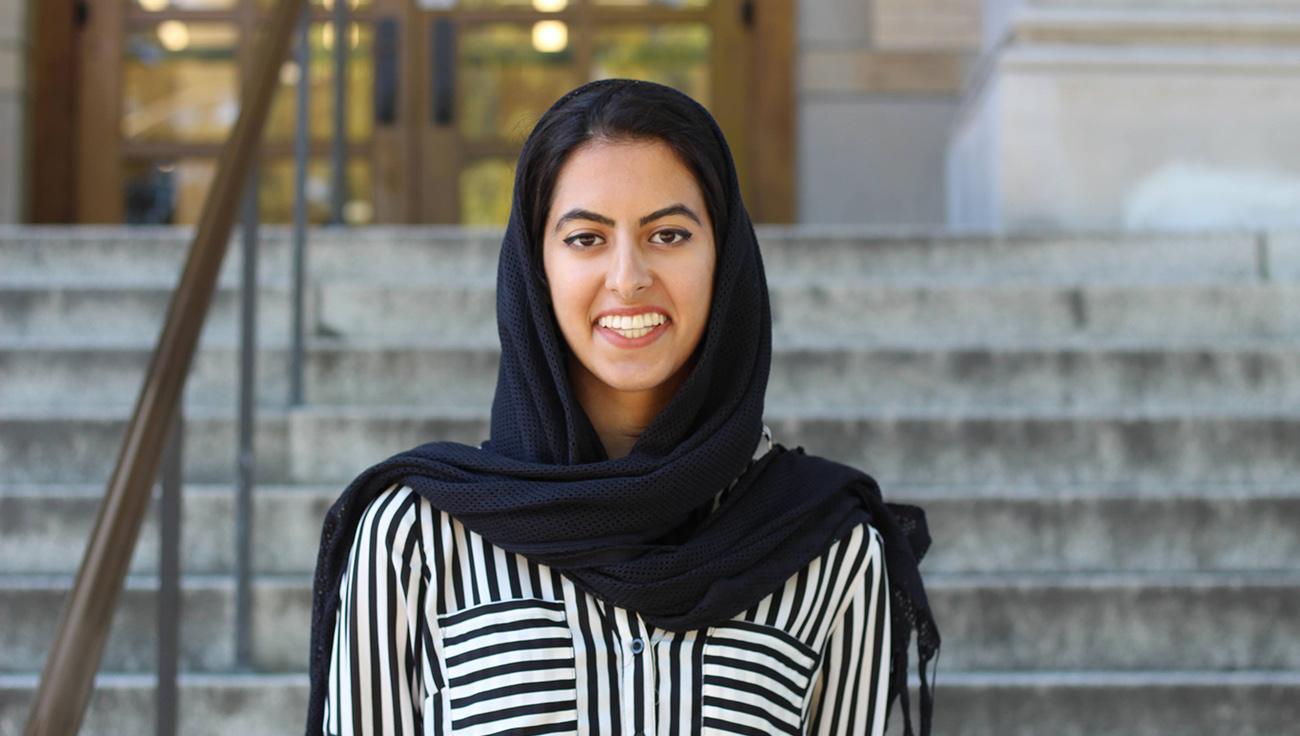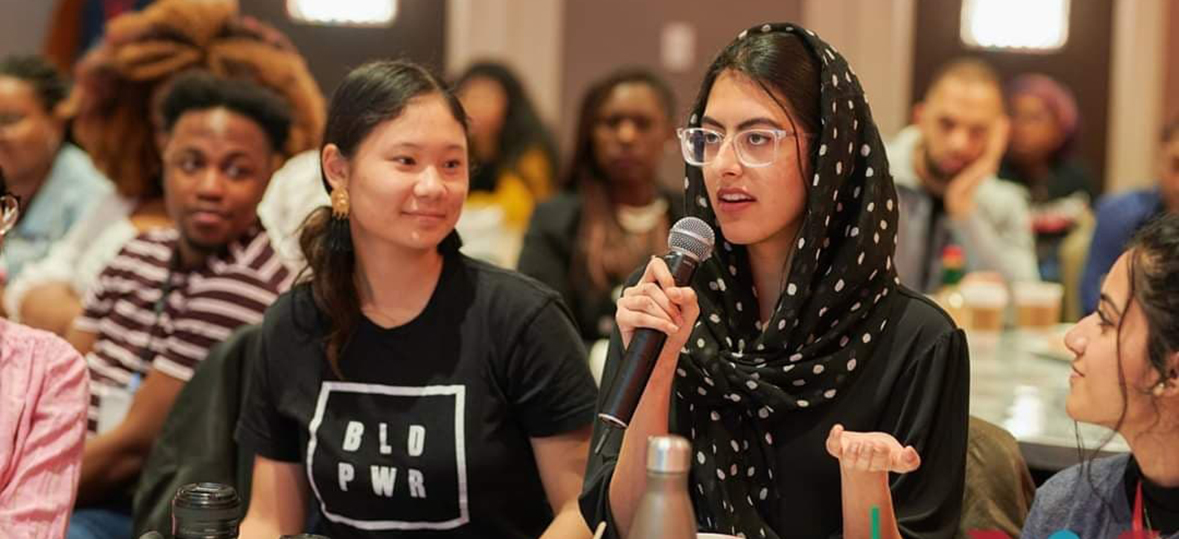From an early age, UW senior Marium Raza understood the importance of affordable health care. Raised in Redmond, Washington, she had excellent health coverage through her father’s employer, but she glimpsed a different reality during summer trips to Pakistan to visit relatives. Health care there was neither covered nor adequate.
“We would basically just avoid going to the doctor while we were there,” Raza recalls. “If we needed anything, we’d wait until we were back in the States. I was always conscious of that, but it wasn’t until I grew up a bit more that I realized some of those same disparities can be found closer to home.”

Raza’s awareness grew at the UW. After becoming close friends with an undocumented student who had no health coverage, she decided to take action, launching a nonprofit that connects uninsured and undocumented communities with community health centers in Washington state. That project has been, in a sense, a culmination of all her experiences at the University.
A Pre-med Humanist
Raza arrived at the UW as a biochemistry major and pre-med student in 2017. She joined a research team in the Department of Physiology and Biophysics that was studying a specific pain receptor, and followed that with an internship in the Department of Anesthesiology & Pain Medicine, looking at women’s pain after breast cancer surgery. It’s no coincidence that both research projects focused on pain; Raza had been diagnosed with rheumatoid arthritis at age 14 and was no stranger to pain herself.
While she was immersed in her science courses and research, Raza found that she missed the “creative and humanist outlook” of non-STEM disciplines. Then she discovered Comparative History of Ideas (CHID), an interdisciplinary liberal arts degree that introduces students to the interrelation of ideas and society. “What I love about CHID is that it gives me an opportunity to explore a wide variety of topics, but always with a historical mindset,” says Raza. She believes such exploration will make her a better doctor. “Medicine is about taking care of people, and people are complicated. It helps to have a broad background.”
Raza added a CHID major to her busy schedule but also found time to volunteer with University District Street Medicine (UDSM), a UW student organization. UDSM brings together students from a variety of health-related disciplines who walk through the University District providing on-the-spot basic care to homeless individuals. Teams include a physician or nurse, one or two graduate students, and an undergraduate “scribe” to record data. “It’s like a clinic on the go, on a very small scale, serving folks where they are,” says Raza, who first served as a UDSM volunteer, then volunteer coordinator, and finally co-director this year.
Identifying a Need
Often on her rounds with UDSM, Raza wished she could refer patients with more complex health issues to a free clinic. That got her wondering what clinics would be best for someone without health insurance. Seeing her undocumented friend’s challenges with health care added to her motivation. She began researching options in the Seattle area and found the experience frustrating. Only a few large chain clinics had an online presence; others were difficult to find. Over several months, she called or visited numerous clinics and spoke with many knowledgeable social workers about services available in the region.
“I tried to imagine someone who doesn’t speak English as their first language, or with limited time to do research, trying to navigate all this,” Raza says. “I thought there had to be an easier way to connect folks with community services and community health care.”

From that idea, Elixir, a 501c3 nonprofit, was born. Raza enlisted UW computer science & engineering majors Falak Daud, Elena Spasova, and Sofia Viotto to help develop an Elixir app, which provides links to a range of free or low-cost health-related services in the Puget Sound area. Raza participated in a Social Venture Partners competition for funding, and — as the only college student competing — placed second in the startup nonprofit category. (See a video of Raza's impressive five-minute presentation below.) She went on to win other competitions and has since raised about $10,000 for Elixir.
An Evolving Project
Despite that success, Raza discovered a flaw in her plan for Elixir. Though the app was a valuable resource, it would only succeed if the intended audience trusted the information. And given the risks faced by the undocumented community, why should they trust her? She realized that she needed more contact with the intended communities. She and her Elixir partners created workshops about health care resources, which they presented at community and cultural centers such as El Centro de la Raza and local mosques.
“A lot of folks we met at the workshops said the app made a lot of sense and they would use it, but that they wouldn’t have if they hadn’t met us,” says Raza. “They needed to see that we were not associated with the police or with ICE, that we’re just regular people.”
Since the pandemic, the workshops have been temporarily on hold, though they may soon be offered online. The app is being updated to reflect clinic changes, since some clinics stopped providing regular services during COVID-19 and others expect to reopen soon. Elixir is preparing to switch to a web-based format, since many potential users have indicated that they would be more likely to visit a website than download an app.
Given her work with Elixir, Raza briefly considered going “full-on” into the nonprofit world after she graduates rather than pursuing a medical degree. But then she decided she could make a greater impact as a doctor.
“There are large structural issues in health care that need fixing, and a lot of those structural fixes will need to come from healthcare professionals,” she says. “I think continuing my education will help me be better prepared to come up with solutions.”
More Stories

AI in the Classroom? For Faculty, It's Complicated
Three College of Arts & Sciences professors discuss the impact of AI on their teaching and on student learning. The consensus? It’s complicated.

Bringing Music to Life Through Audio Engineering
UW School of Music alum Andrea Roberts, an audio engineer, has worked with recording artists in a wide range of genres — including Beyoncé.

A Love of Classics and Ballroom
Michael Seguin studied Classics at the UW and now owns Baltimore's Mobtown Ballroom. The two interests, he says, are more connected than they might seem.